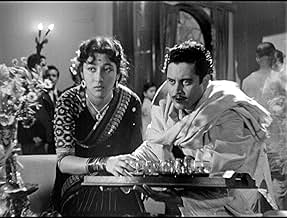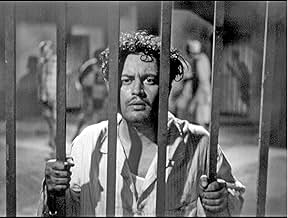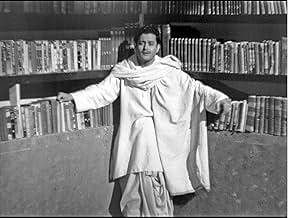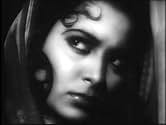IMDb-BEWERTUNG
8,3/10
7831
IHRE BEWERTUNG
Füge eine Handlung in deiner Sprache hinzuVijay, a talented but indigent poet, struggles for love and recognition in this selfish world.Vijay, a talented but indigent poet, struggles for love and recognition in this selfish world.Vijay, a talented but indigent poet, struggles for love and recognition in this selfish world.
Rehman Khan
- Ghosh
- (as Rehman)
Leela Mishra
- Vijay's Mother
- (as Leela Misra)
Moni Chatterjee
- Chatterjee
- (as Moni Chatterji)
Empfohlene Bewertungen
A musical melodrama from the Hindi film industry of Bombay, now popularly known as "Bollywood", although it wasn't called that back then. Well this movie is certainly a lot better than any of the more recent "Bollywood" musicals I've seen, and it's probably even one of the best musicals I've ever seen from anywhere. What really stands out in Pyaasa in particular is how the music is often used to express serious themes and social critiques, which is something I've rarely ever seen in a musical. The ending was also quite unexpected and very moving. The last few scenes and dialogues in particular were powerful and had a lot of meaning to them.
The star of the show here is Guru Dutt, who was not only the director and producer, but also starred in the film as the protagonist Vijay (a struggling poet from the slums), comparable to the versatility of Orson Welles in Citizen Kane. The two main actresses in the film, Mala Sinha as the married ex-girlfriend Meena and especially Waheeda Rehman as the prostitute Gulabo, were also impressive. In some ways, the story has some similarities to that of Moulin Rouge! (2001) but even better than that in my opinion. The music by S. D. Burman and his son R. D. Burman also has a timeless feel to it. I would highly recommend this movie to musical fans, or even if one is not a musical fan, I still think it's worth checking out.
9/10
The star of the show here is Guru Dutt, who was not only the director and producer, but also starred in the film as the protagonist Vijay (a struggling poet from the slums), comparable to the versatility of Orson Welles in Citizen Kane. The two main actresses in the film, Mala Sinha as the married ex-girlfriend Meena and especially Waheeda Rehman as the prostitute Gulabo, were also impressive. In some ways, the story has some similarities to that of Moulin Rouge! (2001) but even better than that in my opinion. The music by S. D. Burman and his son R. D. Burman also has a timeless feel to it. I would highly recommend this movie to musical fans, or even if one is not a musical fan, I still think it's worth checking out.
9/10
Guru Dutt had the theme for "Pyaasaa" running in his mind for 4 years before he actually got around to making it. He followed the counsel of friends who advised him to make some money before venturing on such an offbeat drama and made such purely commercial, but thoroughly enjoyable, films as "Aar Paar", "C.I.D" and "Mr & Mrs 55" which were all commercially very successful.
"Pyaasa" starts brilliantly - a man lying down, staring at the sky, the flowers - all very happy. A bee starts buzzing over a flower and then, moves down to the grass. The smile on the poet's face is broken as a man's boot uncaringly descends on the bee. Thats more or less the theme of the film. The uncaring attitude of the society where the struggling ones are trampled over mercilessly. Laced through this is the whole romance triangle with one lady dumping her lover for a well-to-do businessman for the sake of money, and a prostitute who loves the poet truly.
The film is filled with some memorable moments and lots of brilliant shots. My favourite is the sequence where Dutt tries to commit suicide is magnificent - there is no dialogue through that 3 minute sequence. But I think the scene would have been even more remarkable had there been no background music.
V.K.Murthy does an outstanding job with the camera. I compare the Guru Dutt-Murthy combo to the Orson Welles-Greg Tolland combo that created "Citizen Kane". Murthy was even better in "Kaagaz ke phool" - but thats for later. This film is an absolute visual treat.
S.D.Burman does a fair job with the music but it is really Sahir Ludhianvi's poetry thats the pride of the songs in this film. Stinging sharp, the words slam the devious ways of the world, the mercenary nature of the society. The climax, though a trifle melodramatic, is brilliantly conceived.
All in all, this is a film thats worth preserving in your DVD collection. This was Guru Dutt's best film and that is saying a lot ! He is now usually touted as the greatest film director in the commercial world of Hindi films. He demonstrates how a film can be both artistically satisfying as well being throughly entertaining to the masses.
"Pyaasa" starts brilliantly - a man lying down, staring at the sky, the flowers - all very happy. A bee starts buzzing over a flower and then, moves down to the grass. The smile on the poet's face is broken as a man's boot uncaringly descends on the bee. Thats more or less the theme of the film. The uncaring attitude of the society where the struggling ones are trampled over mercilessly. Laced through this is the whole romance triangle with one lady dumping her lover for a well-to-do businessman for the sake of money, and a prostitute who loves the poet truly.
The film is filled with some memorable moments and lots of brilliant shots. My favourite is the sequence where Dutt tries to commit suicide is magnificent - there is no dialogue through that 3 minute sequence. But I think the scene would have been even more remarkable had there been no background music.
V.K.Murthy does an outstanding job with the camera. I compare the Guru Dutt-Murthy combo to the Orson Welles-Greg Tolland combo that created "Citizen Kane". Murthy was even better in "Kaagaz ke phool" - but thats for later. This film is an absolute visual treat.
S.D.Burman does a fair job with the music but it is really Sahir Ludhianvi's poetry thats the pride of the songs in this film. Stinging sharp, the words slam the devious ways of the world, the mercenary nature of the society. The climax, though a trifle melodramatic, is brilliantly conceived.
All in all, this is a film thats worth preserving in your DVD collection. This was Guru Dutt's best film and that is saying a lot ! He is now usually touted as the greatest film director in the commercial world of Hindi films. He demonstrates how a film can be both artistically satisfying as well being throughly entertaining to the masses.
Dutt had been toying with the idea of making 'Pyaasa' for four years. Some of the film echos part of his life story but not as close as the tragedy 'Kaagaz ke Phool' did. It's also very similar to a recent movie I have seen, namely Ghose's 'Yatra'. Maybe Ghose made 'Yatra' as a tribute to Dutt's 'Pyaasa'. 'Pyaasa' is the story of a talented poet Vijay, who struggles through life trying to get his poems published. But, in this materialist world where money and fame rule, there is no one willing to give Vijay's poetry a chance, except one person, a streetwalker called Gulabo. Gulabo is captured by the beauty of his poetry but what can she can do to get the poems published?
'Pyaasa' starts in an unconventional but beautiful way. We see Vijay lying on the park. The poet smiles as he's captured by a bee buzzing over a flower. The smile vanishes as a man's shoe carelessly squashes the bee. This already reflects society's careless attitude towards him. Even Vijay's former lover Meena dumped him because she preferred someone with more wealth.
Murthy's cinematography is outstanding making 'Pyaasa' a visual treat. The songs and poems are beautiful and they are a powerful part of the narration as they reflect moments such as Vijay's love for Meena, Gulabo's love for Vijay's poetry, the brothel where people are traded and the devious society. There are so many wonderful scenes. The moments between Vijay and Gulabo are some of my favorites.
The performances are top notch. Guru Dutt becomes Vijay and allows the viewer to feel his struggles. Waheeda Rehman is breathtaking and plays her part to perfection. Mala Sinha and Rehman do very well. Johnny Walker is hilarious.
'Pyaasa' is Dutt's achievement on multiple levels. One of the best of Indian cinema and no wonder why he's recognized as one of the greatest filmmakers.
'Pyaasa' starts in an unconventional but beautiful way. We see Vijay lying on the park. The poet smiles as he's captured by a bee buzzing over a flower. The smile vanishes as a man's shoe carelessly squashes the bee. This already reflects society's careless attitude towards him. Even Vijay's former lover Meena dumped him because she preferred someone with more wealth.
Murthy's cinematography is outstanding making 'Pyaasa' a visual treat. The songs and poems are beautiful and they are a powerful part of the narration as they reflect moments such as Vijay's love for Meena, Gulabo's love for Vijay's poetry, the brothel where people are traded and the devious society. There are so many wonderful scenes. The moments between Vijay and Gulabo are some of my favorites.
The performances are top notch. Guru Dutt becomes Vijay and allows the viewer to feel his struggles. Waheeda Rehman is breathtaking and plays her part to perfection. Mala Sinha and Rehman do very well. Johnny Walker is hilarious.
'Pyaasa' is Dutt's achievement on multiple levels. One of the best of Indian cinema and no wonder why he's recognized as one of the greatest filmmakers.
Pyaasa does show its age. There are a lot of things that would perplex or annoy the modern viewer such as jumps in continuity and a simplistic set of characters. However, if one looks past that, then the movie reveals a rich story and a deep message. This is even more astonishing considering that the movie was made in the 50s.
This film is a journey into the mind of Guru Dutt and shows the hurt that sensitive minds, such as those of poets', can feel in modern society. As such, its message transcends time and is still relevant today. Those with less sensitive dispositions, such as mine, will not feel left out and will surely appreciate the story too.
The dialogue is beautiful and the songs are sublime. This is a real pity for those who do not understand Hindi since the subtitles (although decent) rob the words of much of their beauty. I know from other reviews on this site that non-Indian viewers often rightly skip the much-disliked song sequences. I still recommend that they sit through them with the subtitles, of course, turned on. This will convey some sense of the beauty of the songs.
There are several moments when the movie seems idiosyncratic. On both occasions that Abdul Sattar (Johnny Walker) broke out into song, the sudden "change" in his voice seemed absurd. Similarly, several bits of dialogue were almost comical when they were meant to be serious, especially in the case of the first publisher. The video itself looks jaded and the sound leaves a lot to be desired. But as I stated earlier, one must look past this to truly enjoy this splendid movie.
One of the striking things about the movie that I must mention is how much India seems to have changed since 1957. Perhaps this is because of the way the movie was shot. The Indian city of the 50s seems very wide and open and even though it is shown teeming with people, there is certain spaciousness about the whole thing. This stands in stark contrast to the clustered urban environment of today.
In all, I would highly recommend this movie to film lovers, both Indian and otherwise.
This film is a journey into the mind of Guru Dutt and shows the hurt that sensitive minds, such as those of poets', can feel in modern society. As such, its message transcends time and is still relevant today. Those with less sensitive dispositions, such as mine, will not feel left out and will surely appreciate the story too.
The dialogue is beautiful and the songs are sublime. This is a real pity for those who do not understand Hindi since the subtitles (although decent) rob the words of much of their beauty. I know from other reviews on this site that non-Indian viewers often rightly skip the much-disliked song sequences. I still recommend that they sit through them with the subtitles, of course, turned on. This will convey some sense of the beauty of the songs.
There are several moments when the movie seems idiosyncratic. On both occasions that Abdul Sattar (Johnny Walker) broke out into song, the sudden "change" in his voice seemed absurd. Similarly, several bits of dialogue were almost comical when they were meant to be serious, especially in the case of the first publisher. The video itself looks jaded and the sound leaves a lot to be desired. But as I stated earlier, one must look past this to truly enjoy this splendid movie.
One of the striking things about the movie that I must mention is how much India seems to have changed since 1957. Perhaps this is because of the way the movie was shot. The Indian city of the 50s seems very wide and open and even though it is shown teeming with people, there is certain spaciousness about the whole thing. This stands in stark contrast to the clustered urban environment of today.
In all, I would highly recommend this movie to film lovers, both Indian and otherwise.
In search of a little selfless love a poet struggles to make it trough this cruel world.
In this world there is nothing such as true love and everything can be bought with money and power. The lead character of this movie does not realize this and when he does eventually, he still does not want to accept the fact which leaves him no choice but to go in exile.
Of all the Hindi movies made to date, this one came closest to the painful realities life. A MUST SEE GURU DUTT FILM.
In this world there is nothing such as true love and everything can be bought with money and power. The lead character of this movie does not realize this and when he does eventually, he still does not want to accept the fact which leaves him no choice but to go in exile.
Of all the Hindi movies made to date, this one came closest to the painful realities life. A MUST SEE GURU DUTT FILM.
Wusstest du schon
- WissenswertesDilip Kumar was the first choice for the lead role but due to his absence on the opening day of shooting due to unknown reason director Guru Dutt decided to act as the lead actor.
- VerbindungenFeatured in Road, Movie (2009)
- SoundtracksJinhen Naaz Hai Hind Par Woh Kahaan Hain
Sung by Mohammad Rafi
Music composed by Sachin Dev Burman
Lyrics by Sahir Ludhianvi
Top-Auswahl
Melde dich zum Bewerten an und greife auf die Watchlist für personalisierte Empfehlungen zu.
- How long is Thirst?Powered by Alexa
Details
- Erscheinungsdatum
- Herkunftsland
- Offizieller Standort
- Sprache
- Auch bekannt als
- Thirst
- Drehorte
- Kolkata, Westbengalen, Indien(exterior scenes)
- Produktionsfirma
- Weitere beteiligte Unternehmen bei IMDbPro anzeigen
- Laufzeit2 Stunden 26 Minuten
- Farbe
- Seitenverhältnis
- 1.33 : 1
Zu dieser Seite beitragen
Bearbeitung vorschlagen oder fehlenden Inhalt hinzufügen































